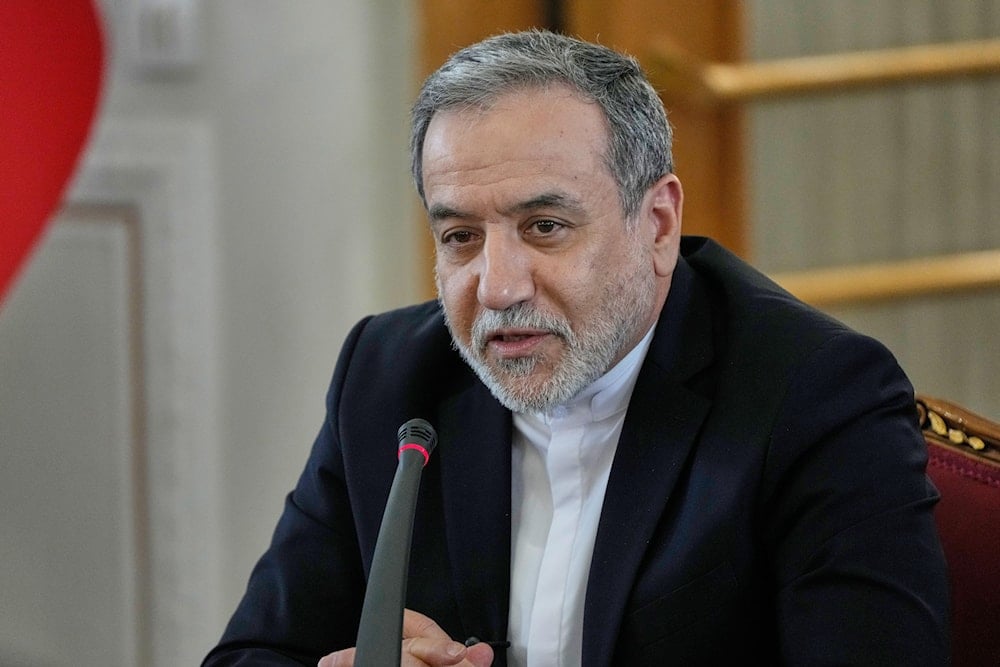No ground for negotiations with E3 anymore: Iran's Araghchi
Iran's foreign minister announces that Tehran no longer sees a basis for nuclear talks with the E3 and criticizes US attempts to bypass Iran’s conditions.
-

Iranian Foreign Minister Abbas Araghchi speaks in a meeting with ambassadors and representatives of foreign countries in Tehran, Iran, Sunday, Oct. 5, 2025 (AP)
Tehran no longer sees a basis for nuclear talks with the E3 countries, Iranian Foreign Minister Abbas Araghchi stated on Saturday evening, adding that the country is not seeking it either.
Speaking to the Iranian state TV, Araghchi revealed that Washington had asked to hold direct talks with Tehran on the sidelines of the UN meetings, a message conveyed by US envoy Steve Witkoff. Iran, according to Araghchi, expressed readiness to engage, but only on the condition that representatives from the E3 countries and that IAEA Director Rafael Grossi be present, which Witkoff refused.
“The reason was that he had insisted that we accept their demands before holding the meeting,” Araghchi said.
In this context, the top Iranian diplomat revealed that "the United States has always sought to integrate regional issues into nuclear negotiations, but we have never allowed that," describing Washington's positions as "constantly changing".
Iran's interests are red line
Regarding Tehran's red lines, Araghchi confirmed that the interests of the Iranian people are paramount, emphasizing that while Iran will never give up its right to enrich uranium, it is willing to provide the international community with assurances, if need be, about the peaceful nature of its nuclear program.
He also cited Leader of the Islamic Revolution Ayatollah Sayyed Ali Khamenei as describing talks with the US as “a complete deadlock,” though he added, “this does not mean a total rejection of negotiations.”
“If a reasonable, balanced proposal based on mutual interests and mutual respect is presented, one that safeguards the interests of the Iranian people from a position of equality, it will certainly be considered.”
“We will not give up Iran’s right to enrichment," Araghchi said, reminding that the rights of the Iranian people were a red line.
He further criticized Europe, stating it has demonstrated a lack of independence, and indicated that Iran remains open to studying any new, fair plan from Washington as long as it respects the interests of the Iranian people, expressing a willingness to engage in dialogue.
On the topic of the Cairo Agreement, Araghchi stated, "It is currently frozen, and our cooperation with the Agency is only conducted within the framework of the Iranian parliament's law and through the Supreme National Security Council."
Araghchi addressed the prospect of renewed war with "Israel", disclosing that, following an exchange between Russian President Vladimir Putin and Israeli Prime Minister Benjamin Netanyahu several days ago, Russian officials subsequently informed the Iranian ambassador in Moscow that Netanyahu has no interest in returning to a state of war with Iran.
Gaza ceasefire solely a Palestinian Resistance matter
Iranian Foreign Minister Araghchi addressed the ceasefire agreement in Gaza, denying that any discussions had taken place with Steve Witkoff concerning it, while affirming Iran's support for any plan that would halt what he described as Israeli crimes.
Araghchi said Trump shared his view on Iran's statement about the Gaza deal, but no messages were exchanged with Washington, adding that only the Palestinian Resistance and people can decide on a ceasefire, and no one else.
He stressed that "Israel" is not trustworthy, citing past experiences like Lebanon, which is clear proof that the entity does not honor its commitments, based on which Iran raised its concerns and issued the necessary warnings. He added that while Washington has made positive promises regarding the Gaza deal, there are doubts about its seriousness in fulfilling them, as these promises are constantly shifting.
Araghchi also noted that most foreign ministers in the region are skeptical about the future of the subsequent phases of the Gaza agreement.
On the issue of the normalization agreements, Iran's FM noted that "these deals intrinsically constitute a sinister plan to deprive the Palestinian people of their rights," adding that Iran's position on such agreements is clear: "it will never join them."
Regarding the trade war imposed by Washington, Araghchi stated that Iran would reciprocate in kind if its commercial ships were obstructed in any way under the pretext of sanctions, affirming that escalating tensions is not in anyone's interest.

 4 Min Read
4 Min Read








